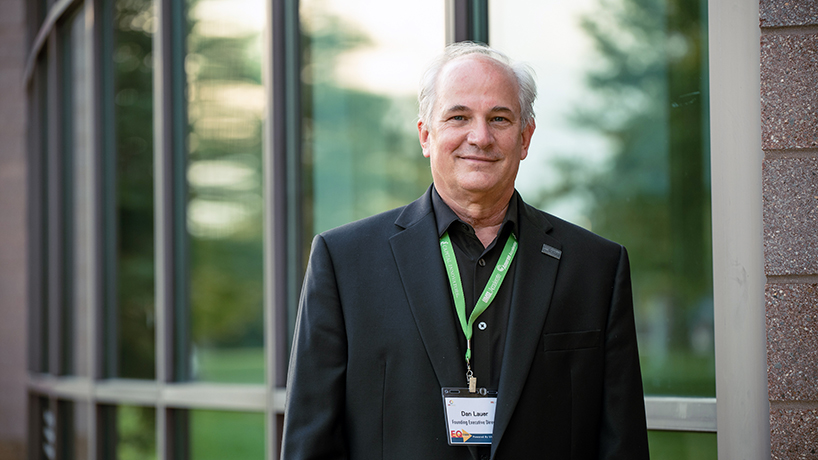
Dan Lauer, the founding executive director of UMSL Accelerate and the Anchor Accelerator, a purpose-driven, university-led accelerator for local entrepreneurs that begins with a non-dilutive $50,000 capital injection. He’s also Lauer Toys CEO and founder and the creator of Waterbabies, the second bestselling baby doll with more than 24 million units sold. (Photos courtesy of UMSL Accelerate)
The Fattened Caf needed a pivot.
The startup Filipino BBQ popup had gone from selling 300 plates in two hours to a standstill as the COVID-19 pandemic closed doors at Missouri restaurants in March 2020. They’d changed focus to takeout then to ready-to-eat meals, but still, the business needed to do something different.
“We lost about 50% to 60% of our revenue with COVID,” said Charlene Lopez-Young, who founded the Fattened Caf with her husband Darren Young.

Charlene Lopez-Young (right) and Darren Young (left) founded the Fattened Caf, a Filipino BBQ popup. Receiving one of the six inaugural UMSL Anchor Accelerator spots helped them grown their business, and they are now selling Filipino sausage, Longganisa, in grocery stores and have bottled products, a national expansion and e-commerce on the horizon.
That could have been the moment the startup stalled. But, instead, the business flourished as the founders pivoted once more to consumer goods and began selling Filipino sausage, Longganisa, in grocery stores. The business now has bottled products, a national expansion and e-commerce on the horizon.
Their story illustrates the three reasons some startups succeed and some fail, says University of Missouri–St. Louis’s Dan Lauer, the founding executive director of UMSL Accelerate and the Anchor Accelerator, a purpose-driven, university-led accelerator for local entrepreneurs that begins with a non-dilutive $50,000 capital injection, which recently announced its second annual cohort of founders.
Lauer’s expertise also extends from his personal experience as Lauer Toys CEO and founder and the creator of Waterbabies, the second bestselling baby doll with over 24 million units sold.
“It takes a combination of product, people and capital to bring a business forward,” Lauer said. “I’ve seen lesser ideas win and better ideas fail.”
Capital
Right at their sticking point, the Fattened Caf founders received one of the six inaugural UMSL Anchor Accelerator spots, securing $50,000 to grow their business.
The capital gave them the ability to be agile.
“We found a copacker who can make 1,000 pounds of the sausages in a week,” Lopez-Young said, noting they’d also obtained USDA approval and invested in branding and equipment. “Now, we are direct to grocery stores and are in 67 Schnucks locations. Our hope is that, in three to five years, our sausages are available nationwide.”
The Fattened Caf’s experience illustrates how founders need capital not only to start their businesses but to sustain them.
“Early access is the hardest because everything takes twice as long, and it cost twice as much,” Lauer said. “The first round is not going to get founders to the end. But all investors know that the first round better get them to a milestone that will allow them to raise more money. Access to capital is the hardest thing for a startup.”
People
Initially, the Youngs intended to use their $50,000 to invest in a brick-and-mortar space but reconsidered after the UMSL mentors got the founders thinking about business scalability and what lifestyle they wanted.
“We knew this was a way for us to keep selling sausages in a place that stays open almost 24/7,” Lopez-Young said. “It was a great way for us to exist and thrive throughout a time that was so difficult.”
Lopez-Young’s willingness to be coached demonstrates Lauer’s second criteria for startup success: the people.
“If you’re not open to growth, you don’t create a culture of bringing people to you,” he said. “Entrepreneurship is a game of enrollment, and the founder has to be compelling and set a good culture. Know your strengths, know your weaknesses and build a team around you to complement them.”
Product
When the Fattened Caf first opened as a pop-up and then as it moved to selling in stores, the startup entered a market with a distinct product unlike any other in the region.
“My husband is African American, and I’m Filipino American,” Lopez-Young said. “We want both our cultures to be represented, and that’s why we focused on barbecue.”
Their strong identities helped create a strong product, which is Lauer’s final – and most important – element for startup success.
Startups should go through customer discovery, a survey process that examines product market fit, including the size of the need for the product, optimal pricing and existing competition. The result helps founders know just how good their product is and how successful it might be.
“A lot of people think their idea is so wonderful, they raise money and they come up with a product that no one really wants,” he said. “The first thing is product, product, product.”














